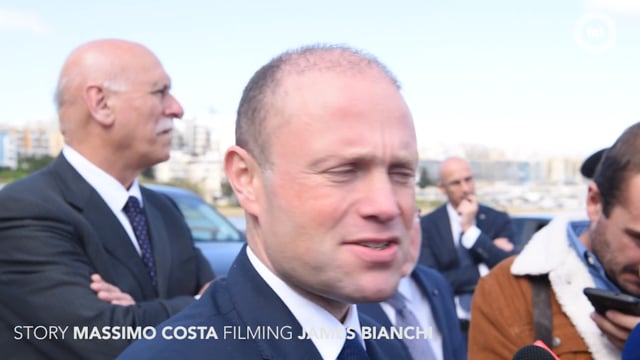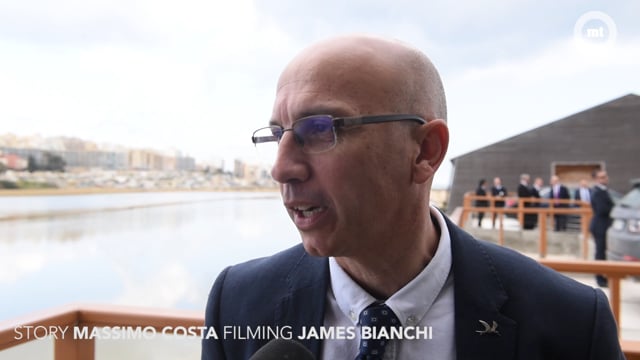[WATCH] Updated | Gozo could be pilot island for switch to electric vehicles, Prime Minister suggests
Prime Minister Joseph Muscat said the construction and operation of the Gozo tunnel by a private company without government subsidies was 'very feasible'


Gozo could potentially be used as a pilot project for the switch to all-electric vehicles, the Prime Minister has suggested.
Joseph Muscat said that the feasability of this still had to be tested, but that the government wanted Malta to be at the forefront in Europe for the change to electric cars.
Speaking at a special Cabinet meeting at the Salina Nature Reserve - meant to take stock of the government's environmental measures and projects - Muscat said that the change from conventional cars to ones powered by electricity would be one of the biggest environmental projects.
"We don't want to be laggards when it comes to this change... But we still need to put in place a strong thinking process on this, and internal and external consultations need to continue," he said.

The plastic bottles return scheme, which is planned to come into place by the end of this year, was another important area of change highlighted by Muscat.
"We need another big cultural change here, and we will be criticised for introducing what might be seen as a burdens, since the bottle will be given a 10c monetary value which will add to its price. But the message is that to get that money back, you just need to return the bottle," he said.
The Prime Minister also underlined the importance of the waste separation scheme, which he said has had encouraging results.
"I believe that what the government has been doing with the national waste policy in the last months has been long overdue. We are happy that finally something is happening and the collective responsibility which families and industry have to separate waste is being understood," he said.
"The figures are now very encouraging, and indicate that people are separating their waste. Large quantities of waste which would have otherwise been dumpled in landfills are now being used as a resources, including to generate energy," he added.
Gozo tunnel could involve public service obligations for private operator
Asked after the cabinet meeting was over on whether he felt that it was feasible for a private company to build and operate the tunnel connecting Gozo to Malta without any government subsidies in place, Muscat said he was confident this was possible.
He said that a model had already been drawn up for which interest was shown on an international level by companies which might want to carry out the project.
“It is very feasible. The idea is to have a build, operate, maintain and transfer model. There is a model in this respect which has already been audited by [economist] Gordon Cordina. From the interest shown in the project on an international level, I am very confident about this,” he said.
Muscat, however, also hinted at having public service obligations (PSOs) in place when it comes to the undertaking of the project by a private firm. In European Union law, PSOs are arrangements by which the government can compensate companies which provide a public service
“It doesn’t mean that various PSOs shouldn't be considered,” he said, “If the government obliges an operator to fulfil certain obligations, then it would have to compensate them.”
He also touched upon the idea of having a metro operating through the tunnel, reiterating what he said on Sunday regarding this necessitating a considerable population increase in Gozo for it to make financial sense.
“The metro would not be feasible unless Gozo’s population increases substantially, and I understand there is a consensus that we don’t want to go for such a development model.”
The only other way that such a metro would be possible is if the government offers heavy subsidies, he said. “But this would lead to the creation of white elephants.”
Regarding building a metro system for Malta, Muscat said that this would cost “hundreds of millions of euro” and take 25 years to build. “Studies and plans on this, however, are at an advanced stage. But before we start anything, we first have to have decent roads. Let’s improve our roads first, and then we can start talking about a metro.”
Consider the environment in every project - BirdLife Malta CEO

BirdLife Malta CEO Mark Sultana, whose NGO was hosting the cabinet meeting at Salina, underlined the importance of prioritising the environment in every project which takes place, including the Gozo-Malta tunnel and land reclamation.
It is also essential that the government identifies the need to give importance to the natural environment, Sultana said. “We speak widely about the environment, but the natural environment keeps declining in Malta. So we should define the natural environment and start protecting it.”
“I hope that today’s cabinet meeting will inspire our politicians to make decisions which factor in the environment,” he remarked.























